Bali Nine executions viewpoints: Are Australia-Indonesia ties at risk?
- Published
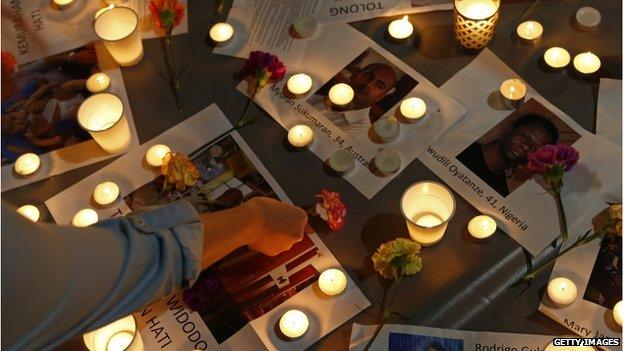
Vigils have been held in Sydney for the prisoners
The execution of convicted drug traffickers Andrew Chan and Myuran Sukumaran in Indonesia has been met with a public outcry in Australia. Two experts give their take on how the incident could affect bilateral relations.
View from Australia: Ties at risk
Greg Fealy, associate professor in the College of Asia and the Pacific of the Australian National University
There are sharply contrasting community attitudes in Australia and Indonesia about the merits of the death penalty and whether to ever show mercy to drug-runners.
The differences tell us much about how public opinion in these neighbouring democracies shape government policies and the bilateral relationship.
Australian Prime Minister Tony Abbott's government is under mounting public pressure to respond emphatically to the execution.
Growing sympathy
When Andrew Chan and Myuran Sukumaran were sentenced to death a decade ago, the public seemed largely unperturbed, with many Australians believing both men were guilty of a reprehensible offence in a country well known for its harsh anti-drug laws.
However, over the past year, as awareness spread of Chan and Sukumaran's remorse and rehabilitation, media and public sympathy towards them grew to a point where polls show a large majority supported clemency.
Allegations that Indonesian judges in the original trial sought bribes in exchange for reducing the sentences for the two men have underscored impressions in Australia the men have not been treated fairly.
Likewise, claims that Indonesian President Joko Widodo did not closely consider the men's clemency pleas as required by law, has angered some Australians.
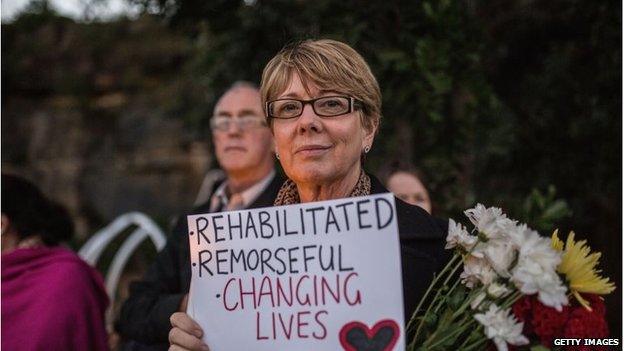
Australian sympathy for the Bali Nine duo has grown in recent months
Australians have come to believe Chan and Sukumaran worthy of mercy but most Indonesians think they deserved capital punishment. They believe the death penalty could help stop the spread of narcotics in their communities.
President Widodo has repeatedly said Indonesia faces a drug crisis that kills 40 to 50 people per day and has created 4.5 million drug addicts. Experts challenge the veracity of those figures but the numbers have struck a chord in a society in which many families have drug-addicted relatives.
As international criticism has become louder, many Indonesian political leaders have come to regard the executions as a matter of national sovereignty. Nationalist sentiment has been rising in Indonesia in recent years and the intertwining of legal and diplomatic issues has made the matter increasingly complex for foreign governments seeking a reprieve for their citizens facing execution.
The Abbott government has waged one of the most concerted diplomatic campaigns in recent memory to win clemency for Chan and Sukumaran, albeit mostly behind closed doors.
Not budging
Australian leaders have been, for the most part cautious, in their public remarks, although Prime Minister Abbott's linking of Australia's generous tsunami aid to the clemency campaign was strongly criticised in Indonesia.
None of the Australian government's efforts have budged President Widodo. Having declared he would execute drug peddlers regardless of international opinion, he does not feel he can now back down without incurring massive political damage. With his approval ratings in decline, this is something he can ill afford.
The Abbott government must weigh carefully its response. Much as it would like to express anger at the executions, it has a broad portfolio of strategic, diplomatic and economic interests in Indonesia that it will be reluctant to jeopardise.
View from Indonesia: No drastic change
Iis Gindarsah, researcher in the Centre for Strategic and International Studies in Jakarta
The Indonesian government maintains a firm stand on the execution of the latest batch of drug traffickers. The attorney general's office has repeatedly stressed that the decision had a strong legal basis as each death row inmate had been through a trial process three times.
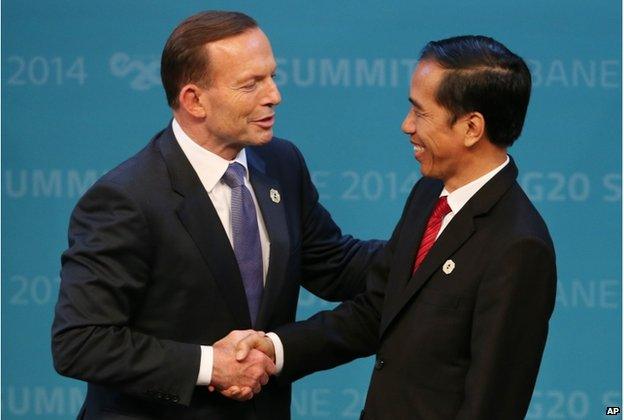
Australia and Indonesia have been close partners on several issues including security in the region
While other countries will convey formal diplomatic notes to register their regrets, the major powers - such as Australia, Brazil and France - may withdraw their respective ambassadors from Indonesia following the executions.
Given the geographical proximity, the executions of Andrew Chan and Myuran Sukumaran could further complicate diplomatic ties between Jakarta and Canberra.
In addition to bilateral tension over illegal migrants and a spying row, the latest issue is likely to hinder efforts on confidence building and enhancing military inter-operability between two countries.
The capital punishment could also be a precedent for other countries, potentially limiting the prospect of international co-operation against transnational organised crimes, including drug trafficking.
Strategic location
However, Indonesia's bilateral relationship with Australia will recover soon, as geopolitical factors gain more prominence in foreign and defence policy-making.
The country's strategic location has been among the key diplomatic modality in forging bilateral ties with partners.
Although Canberra would suspend regular diplomatic meetings for some time, it is unlikely to further risk the implementation of the 2007 Lombok Treaty on bilateral security co-operation - including counter-terrorism, maritime safety and security - for continued diplomatic quarrels with Jakarta over drug trafficker executions.
Both sides must learn from their past experience that it took a painful process to normalise diplomatic ties following Australian-led intervention in East Timor back in the late 1990s.
Other countries affected
Today, France and Indonesia enjoy closer defence ties. Joining the Australian-led coalition of opponents to the death penalty of drug traffickers would only convey a wrong message by France to the Indonesian government.
This potentially affects Jakarta's future arms acquisition decisions - including the replacement of the rapidly ageing F-5 Tiger jet fighter. The French defence industry is among the key bidders of new combat aircraft.
Given its pivotal position, the United States has a great stake in the maintenance of regional security and stability.
Increased tension with Australia could distract Indonesia from playing a key role in East Asian stability and mediating regional disputes in the South China Sea.
And given Washington's rebalancing strategy, the US would feel discomfort to see Canberra's diplomatic pressures further prompting Jakarta to become more lenient toward China - and to a lesser degree Russia.
In short, the executions of foreign death row inmates may bring about amplified diplomatic protests, but are unlikely to cause drastic change in Indonesia's bilateral relationship with strategic partners.
- Published4 March 2015
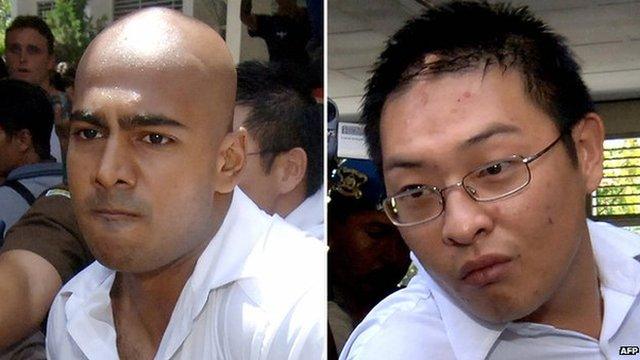
- Published29 April 2015
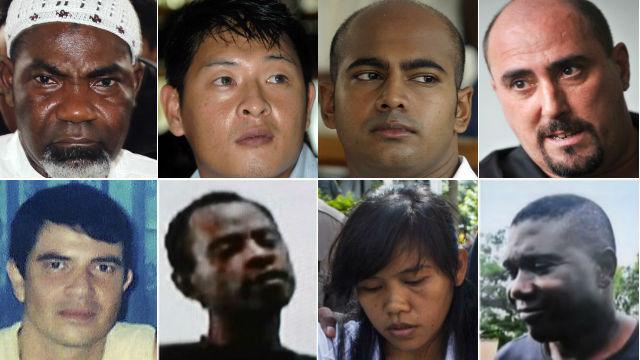
- Published28 April 2015
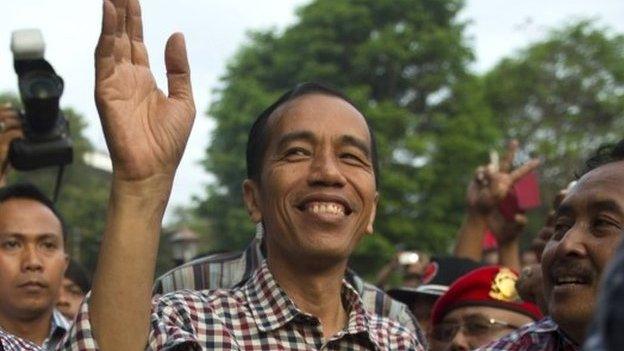
- Published29 April 2015
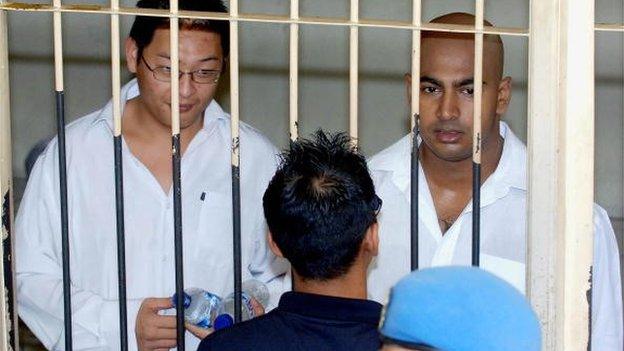
- Published29 April 2015